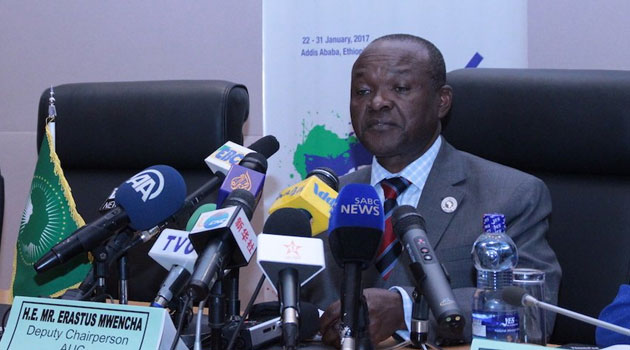
Erastus Mwencha conceded that it had lit a fire under them to more conscientiously pursue the goal of a self-sustaining African Union but was quick to make clear that it was a path the continent was already on/COURTESY-AU
ADDIS ABABA, Ethiopia, Jan 27 – It’s been said that when the great US of A sneezes, the rest of the world catches a cold but only half in jest and so it was that America’s President Donald Trump’s assumption of office added an admitted sense of “urgency” to the AU Summit being held in Addis Ababa this week given his “America first,” foreign policy.
Addressing the press on Friday, the outgoing African Union Commission Deputy Chairperson Erastus Mwencha conceded that it had lit a fire under them to more conscientiously pursue the goal of a self-sustaining African Union but was quick to make clear that it was a path the continent was already on.
Round about the time Trump secured the Republican nomination and the EU slashed its monetary support to the African Union Mission in Somalia – in July of 2016 – over 30 of Africa’s Heads of State and Government convened at a ‘Retreat on Financing of the Union’ and drew up a sustainability game plan as it were, Mwencha said.
It was decided at the retreat that the best approach to resolving the “absurd” over-reliance on development partners, he said, was to impose a 0.2 percent import levy on unspecified eligible goods imported into member states from non-member states.
“Under existing arrangements, the Union’s budget continues to be underfunded by both the member states and development partners. About 30 member States default either partially or completely on average, annually.” Understandable, in his estimation, given competing national budgetary demands.
It was agreed that the levy would come into force this year but transitionally, Mwencha said, to allow for the approvals of Parliament in some countries.
“Each country will select the appropriate financial institution or customs authority responsible for assessment and collection of the AU import levy. Once the revenue is collected as AU import levy, it is then deposited into an account opened in the name of the ‘African Union’ with the Central, National or Reserve Bank of each member state.”
And he singled out Kenya, Rwanda, Chad, Ethiopia and the Democratic Republic of Congo as member States who have already initiated action to implement.
The levy expected to finance 100 percent of the operational budget, 75 percent of the program budget and 25 percent of peace support operations.
“The July 2016 Assembly decided that the Peace Fund would be endowed with $325 million in 2017, rising to a total of $400 million by 2020 from the 0.2 percent levy.”
He was however quick to quell the World Trade Organisation’s concern that the levy would contradict other international agreements.
On Sunday, he said, Africa’s Heads of State and Government would again retreat to deliberate on how best to rationalise the AU’s programmes with the political world winds having shifted significantly from the time of US President Barack Obama under whose administration the first US-Africa Summit was held in Washington, the first Global Entrepreneurship Summit on Sub-Saharan soil and the first sitting US President addressed the African Union.
READ: Kenya offers up its ‘strongest’ to AU in changing political climes









































